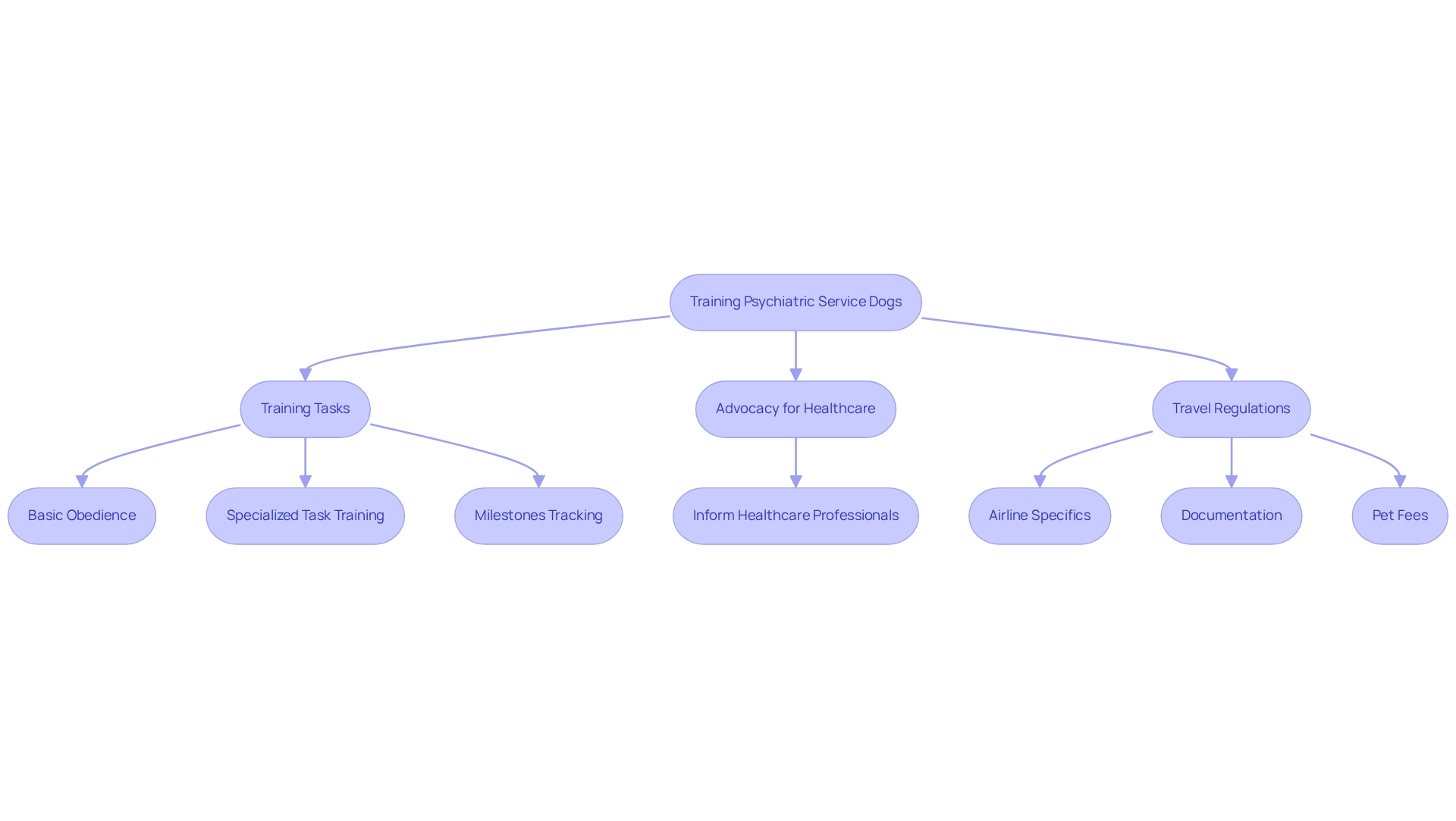

What is a PSD: Understanding Psychiatric Service Dogs and Their Role
by Lena Park
Last updated: June 25, 2025
Verified and Approved by:
Angela Morris,
MSW, LCSW
Fact Checked

Overview
Psychiatric service dogs (PSDs) play a vital role in supporting individuals with psychiatric disabilities. These specially trained animals perform specific tasks that help alleviate symptoms of conditions such as anxiety, PTSD, and depression. It’s important to recognize the emotional challenges faced by those struggling with mental health issues. The unique contributions of PSDs go beyond companionship; they actively assist in managing their handlers’ mental health challenges through trained interventions. This distinction sets them apart from emotional support animals, who primarily offer comfort.
Imagine the relief of having a loyal companion by your side, one who not only provides love but also helps navigate the complexities of daily life. The presence of a PSD can significantly enhance the quality of life for individuals facing these challenges, offering a sense of security and support that is deeply needed. Their ability to perform specific tasks tailored to their handlers’ needs can transform moments of distress into opportunities for healing.
As you reflect on your own experiences or those of someone you care about, consider the profound impact that a PSD can have. Knowing that there are compassionate solutions available can provide hope and reassurance. The journey toward better mental health is not one that needs to be traveled alone; support is available in various forms, including the companionship of a trained service dog. Together, we can foster understanding and empathy for those navigating the complexities of mental health.
Introduction
In a world where mental health challenges are increasingly recognized, psychiatric service dogs (PSDs) emerge as vital allies for individuals navigating their conditions. These specially trained canines offer much more than companionship; they provide practical support that can truly transform lives.
Imagine a loyal dog alerting its handler to an impending anxiety attack or offering deep pressure therapy during moments of distress. PSDs play a crucial role in enhancing the quality of life for those affected by disorders such as PTSD, anxiety, and depression.
As awareness of their significance grows, so too does the understanding of the legal rights and protections that accompany these remarkable animals, paving the way for more inclusive mental health support.
This exploration delves into the multifaceted impact of PSDs, their training, legal status, and the profound benefits they offer to individuals striving for stability and independence.
Define Psychiatric Service Dogs: Understanding Their Role and Purpose
Psychiatric service dogs are specially trained canines that provide essential assistance to individuals diagnosed with psychiatric disabilities, such as anxiety disorders, depression, PTSD, and bipolar disorder. Unlike emotional support animals (ESAs), which primarily offer comfort through companionship, these service animals are trained to perform specific tasks that directly alleviate their handler’s mental well-being symptoms. These tasks can include:
- Alerting the handler to impending anxiety attacks
- Delivering deep pressure therapy during panic episodes
- Guiding them away from stressful environments
The significance of personal support devices goes beyond mere emotional assistance; they actively help in managing their handler’s condition, thereby enhancing overall quality of life and fostering greater independence. Recent studies indicate that individuals utilizing personal support devices have experienced a notable reduction in mental wellness inpatient stays, shifting from crisis admissions to stabilization admissions. This underscores the effectiveness of personalized support devices in providing tangible assistance for those grappling with substantial mental wellness challenges.
In the United States, thousands of psychiatric assistance dogs are trained each year, reflecting an increasing recognition of their vital role in mental wellness support. Mental wellness experts advocate for the integration of psychological support devices into treatment strategies, highlighting their ability to significantly alleviate symptoms of anxiety and depression. Healthcare providers can offer resources and discuss options for individuals considering a psychiatric assistance dog, ensuring that those in need are informed about the support available to them.
As our understanding of the therapeutic benefits of assistance animals continues to evolve, it becomes clear that psychiatric support animals are a crucial ally for individuals striving to navigate the complexities of their mental wellness issues. This study was conducted in accordance with the recommendations of the James Cook University Human Ethics Committee (Ethics Approval Number H7210) with informed consent from all subjects, further emphasizing the importance of this research.
Contextualize the Importance of PSDs in Mental Health Support
The significance of psychiatric assistance canines in supporting mental wellness has garnered considerable attention in recent years. As awareness of mental well-being grows, many individuals find themselves seeking alternative therapies to complement traditional treatments. Personal Support Devices offer a unique blend of companionship and practical support, proving to be life-changing for those facing mental wellness challenges. Research shows that what is a psd can greatly alleviate symptoms of anxiety and depression, enhance social interactions, and improve overall emotional well-being. For numerous individuals, knowing what is a psd is not just beneficial; it is transformative, empowering them to tackle daily challenges with newfound confidence and stability.
Importantly, studies reveal that 27% of cross-sectional research on service animals considered the length of ownership, suggesting that long-term bonds with these animals can foster enduring mental well-being benefits. Furthermore, the psychosocial advantages of support animals can vary significantly based on personal characteristics and circumstances, underscoring the need for tailored approaches in mental wellness support.
Case studies, such as one examining sleep quality among individuals with hearing dogs, illustrate improvements in self-reported sleep quality over time, shedding light on what is a psd and its multifaceted impact on mental well-being. As Dr. Alison Yarp, MD, MPH, wisely notes, “If you are curious about how a PSD may assist you, consult with your medical provider or mental wellness expert.” As this field continues to evolve, ongoing research calls for enhanced methodological rigor to deepen our understanding of the human-animal bond and its implications for mental well-being support.
Examine Legal Rights and Protections for Psychiatric Service Dogs
Psychiatric assistance animals serve as vital support companions under the Americans with Disabilities Act (ADA), granting essential legal rights that allow them to accompany their handlers in public spaces where pets are often restricted, such as restaurants, retail stores, and public transportation. This classification is particularly important for individuals who depend on their psychiatric service dogs, which relates to what is a psd, to navigate mental health challenges. Under the ADA, assistance animal owners enjoy full public access rights, enabling them to bring their assistance animals into various public areas and secure housing arrangements, even in places that typically do not allow pets. In contrast, emotional support animals (ESAs) lack the same legal protections as assistance dogs, a crucial distinction for individuals seeking to understand their rights. Additionally, the Fair Housing Act mandates that individuals with emotional support animals receive reasonable accommodations in housing situations, even in environments that generally restrict pets. Recognizing what is a psd and these legal protections is vital for PSD handlers, empowering them to effectively advocate for their rights.
Recent statistics reveal that many individuals with psychiatric assistance animals face challenges in securing housing arrangements. For instance, studies indicate that approximately 30% of PSD handlers report difficulties in finding pet-friendly housing. Successful advocacy stories highlight how handlers have adeptly navigated these legal frameworks to ensure their rights are respected. Case studies illustrate instances where PSD handlers have successfully contested housing restrictions, underscoring the importance of being informed about one’s legal rights under the ADA and Fair Housing Act. Delilah Suff, a PSD handler, poignantly states, “I don’t think so if you don’t know your rights; it’s crucial to be informed.” This emphasizes the need for awareness and understanding in advocating for the support that is rightfully theirs.
Explore Training and Capabilities of Psychiatric Service Dogs
Training for psychiatric service animals is a meticulous process that truly addresses the unique needs of their handlers. These remarkable canines undergo extensive training to perform essential tasks that assist with various psychiatric conditions. Whether it’s providing deep pressure therapy, interrupting self-harming behaviors, reminding handlers to take medication, or creating a physical barrier in crowded environments to alleviate anxiety, their role is invaluable.
The training regimen encompasses both basic obedience and specialized task training, typically spanning several months to two years. This thorough preparation is crucial, ensuring that these animals are not only well-mannered but also skilled at addressing their handlers’ requirements in various circumstances. For instance, owners are encouraged to track specific milestones, such as obedience in busy areas and the ability to ignore distractions, to determine what is a PSD and if it is ready for public outings. The importance of thorough training is highlighted by the fact that a PSD that does not meet these milestones may be asked to leave public establishments, raising the question of what is a PSD.
As our understanding of PSDs evolves, future advocacy should focus on informing healthcare professionals about the advantages of assistance animals as a viable treatment option. The wait time for acquiring an assistance dog can range from a few months to two years, underscoring the commitment involved in this process. While individuals can find trainers and programs online, it is essential to conduct extensive research, as assistance dogs are not required to undergo professional training or certification under the Americans with Disabilities Act (ADA). This knowledge gap can lead to misunderstandings, as Dr. Meghan Mills, NCHPAD Operations Director, poignantly noted, “There are lots of people out there with disabilities who could benefit from an assistance dog, but they don’t know, understandably, because it’s so confusing and there are so many misunderstandings, they don’t know where to get started.”
Furthermore, for those intending to fly with their PSDs, it is essential to understand the specific regulations of airlines such as Air Canada. Currently, Air Canada recognizes psychiatric assistance dogs, provided they have the proper documentation, including a U.S. DOT Service Animal Air Transportation Form. This form must detail vaccination information, including the dog’s vaccination history, and certify that the PSD is trained to perform specific tasks. Handlers must also accept responsibility for any damages the animal may cause. Having a legitimate PSD letter can facilitate a smoother check-in process, ensuring compliance with airline regulations. Additionally, pet fees on Air Canada vary, with domestic flights costing between $50 and $59 and international flights ranging from $100 to $118. Understanding these guidelines is crucial for working professionals who may need to travel with their PSDs, as it helps avoid potential complications during their journey. It is also important to note that snub-nosed breeds face limitations when traveling, as they cannot be transported as checked baggage or through Air Canada Cargo service due to health risks.

Conclusion
Psychiatric service dogs (PSDs) are becoming essential companions in the journey of mental health support, offering not only companionship but also crucial assistance to those grappling with profound psychological challenges. These specially trained dogs perform vital tasks that can help alleviate symptoms of anxiety, depression, and PTSD, significantly enhancing the quality of life for their handlers. As research continues to unfold, it becomes increasingly clear that PSDs play a pivotal role in reducing hospital admissions and promoting independence, thus becoming integral to holistic treatment approaches.
The legal rights and protections granted to PSDs under the Americans with Disabilities Act empower handlers to access public spaces and secure housing accommodations, which is vital for those who depend on these service animals. By understanding their rights, PSD handlers can advocate for themselves, overcoming obstacles related to housing and public access. This legal framework not only affirms the significance of PSDs but also highlights the need for awareness and education about their capabilities and protections.
As conversations around mental health evolve, the acknowledgment of PSDs as legitimate therapeutic tools is gaining traction. Ongoing research and advocacy are crucial in further illuminating the profound impact these animals have on mental health recovery. With the right training and a clear understanding of their rights, individuals with PSDs can confidently navigate their paths toward stability and empowerment. The partnership between humans and their psychiatric service dogs beautifully illustrates the transformative power of the human-animal bond, emphasizing the importance of continued support and recognition of this invaluable resource in mental health care.
Frequently Asked Questions
What are psychiatric service dogs?
Psychiatric service dogs are specially trained canines that assist individuals diagnosed with psychiatric disabilities, such as anxiety disorders, depression, PTSD, and bipolar disorder.
How do psychiatric service dogs differ from emotional support animals (ESAs)?
Unlike emotional support animals, which primarily provide comfort through companionship, psychiatric service dogs are trained to perform specific tasks that directly alleviate their handler’s mental well-being symptoms.
What specific tasks can psychiatric service dogs perform?
Psychiatric service dogs can perform tasks such as alerting the handler to impending anxiety attacks, delivering deep pressure therapy during panic episodes, and guiding them away from stressful environments.
What impact do psychiatric service dogs have on individuals’ quality of life?
Psychiatric service dogs actively help manage their handler’s condition, enhancing overall quality of life and fostering greater independence.
What does recent research indicate about the effectiveness of psychiatric service dogs?
Recent studies suggest that individuals using psychiatric service dogs have experienced a notable reduction in mental wellness inpatient stays, shifting from crisis admissions to stabilization admissions, indicating their effectiveness in providing tangible assistance.
How many psychiatric assistance dogs are trained each year in the United States?
Thousands of psychiatric assistance dogs are trained each year in the United States, reflecting an increasing recognition of their vital role in mental wellness support.
How do mental wellness experts view the integration of psychiatric service dogs into treatment strategies?
Mental wellness experts advocate for the integration of psychiatric service dogs into treatment strategies, highlighting their ability to significantly alleviate symptoms of anxiety and depression.
What resources are available for individuals considering a psychiatric assistance dog?
Healthcare providers can offer resources and discuss options for individuals considering a psychiatric assistance dog, ensuring they are informed about the support available to them.
What ethical considerations were taken into account in the research on psychiatric service dogs?
The study was conducted in accordance with the recommendations of the James Cook University Human Ethics Committee, with informed consent from all subjects, emphasizing the importance of ethical research practices.
Certify Your Emotional Support Animal Today

Why You Can Rely on Us?
At Wellness Wag, we believe your pet deserves care rooted in both science and compassion. Each article is carefully researched, written in clear language for pet owners, and then reviewed by qualified professionals to ensure the information is evidence-based, current, and practical for real-life care. Our goal is to help you feel confident in making informed decisions about your pet’s health and well-being.
Reviewed by
Angela Morris, MSW, LCSW
Angela is a licensed clinical social worker with 20 years of experience in patient advocacy and community mental health. She has assisted numerous clients with ESA evaluations and brings a deep understanding of disability accommodations, ensuring that all information is accurate, supportive, and practical.

Written by :
Lena Park
Last Updated :
June 25, 2025












